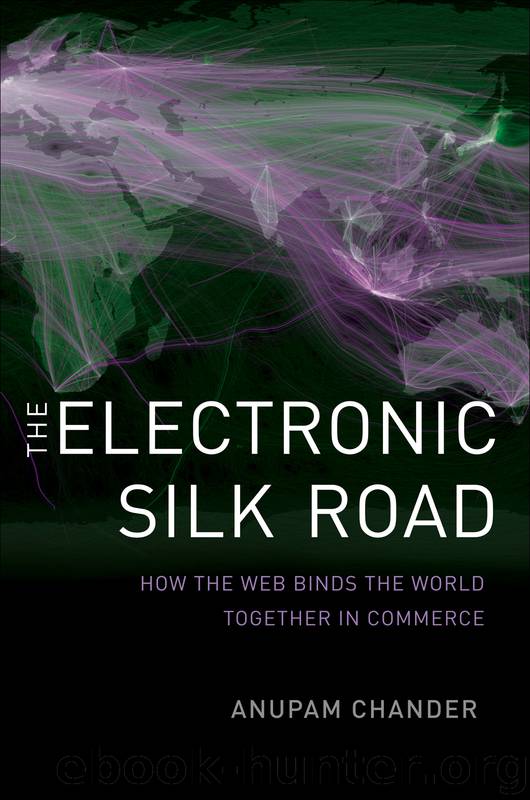The Electronic Silk Road by Anupam Chander

Author:Anupam Chander
Language: eng
Format: epub
Publisher: Yale University Press
Published: 2013-04-08T04:00:00+00:00
6
FREEING TRADE IN CYBERSPACE
At the core of every cybertrade controversy described in this book is a provider in one jurisdiction supplying services to consumers in another. In each case there may be a conflict of laws between the provider’s jurisdiction and the consumer’s. The provider may lack legal precedents or authoritative guidance and must innovate not only technological methods and business models but also legal structures.
Four distinctive legal challenges of electronically tradable services, or Trade 2.0, become apparent: (1) legal roadblocks to the free flow of net-work; (2) the lack of adequate legal infrastructure, as compared to trade in traditional goods; (3) the threat to law itself posed by the footloose nature of net-work and the uncertainty of whose law should govern net-work transactions; and (4) the danger that local control of net-work might lead to either Balkanization—the disintegration of the World Wide Web into local arenas—or Stalinization—the repression of political dissidents, identified through their online activity by compliant net-work service providers.
In this and the following chapters, I discuss a framework to simultaneously liberalize and regulate Trade 2.0 in order to ameliorate the difficulties identified above. To liberalize trade, I introduce two principles: technological neutrality and dematerialization. Technological neutrality would require that online versions of a service be tested under the same legal regime as the offline version of that service, thus not permitting discrimination against the online version of a service. Dematerialization would require governments and services-standards bodies to replace physical in-person requirements with online substitutes wherever possible.
To respond to the risk to law of net-work trade (the third challenge), I suggest the necessity at times of glocalization—abiding by the local law of the jurisdiction in which a service is consumed where that law does not conflict with international law. But the assertion of local law invites the unwelcome consequences of Balkanization and Stalinization. To respond to the problem of Balkanization, countries will need to reinvigorate efforts for harmonization—seeking to agree on the common legal standard or tolerating deviations from local rules. To respond to the problem of Stalinization, companies themselves must adopt policies to “do no evil” and comport with human rights law. In this chapter I focus on the technological neutrality principle. I set out my arguments for the dematerialization, glocalization, harmonization, and do no evil principles in the remaining chapters.
An example might help illustrate these principles. If Yahoo! offers auction services, governments should not evaluate those services on a stricter basis than live, in-person auction services because this would have the effect of discriminating against foreign suppliers of auction services (technological neutrality). If auctioneers are required to have licenses, these should be available to the extent possible remotely, as should contracting and even dispute settlement (dematerialization). Where there is a strong societal commitment to outlawing Nazi paraphernalia, Yahoo! should not offer such material to those jurisdictions (glocalization). Where possible, countries should seek to work together to develop common standards or, alternatively, should recognize each other’s legal regimes as sufficient (harmonization). Yahoo! should refuse to use the
Download
This site does not store any files on its server. We only index and link to content provided by other sites. Please contact the content providers to delete copyright contents if any and email us, we'll remove relevant links or contents immediately.
American Kingpin by Nick Bilton(3886)
Future Crimes by Marc Goodman(3600)
The Meaning of the Library by unknow(2571)
Inside the Middle East by Avi Melamed(2356)
Why Nations Fail: The Origins of Power, Prosperity, and Poverty by Daron Acemoglu & James Robinson(2297)
On Tyranny by Timothy Snyder(2232)
Living Silence in Burma by Christina Fink(2071)
Putin's Labyrinth(2022)
The Mastermind by Evan Ratliff(1938)
The Smartest Kids in the World by Amanda Ripley(1856)
Think Like a Rocket Scientist by Ozan Varol(1821)
Law: A Very Short Introduction by Raymond Wacks(1748)
It's Our Turn to Eat by Michela Wrong(1731)
The Rule of Law by Bingham Tom(1698)
Philosophy of law a very short introduction by Raymond Wacks(1670)
Leadership by Doris Kearns Goodwin(1638)
A Dirty War by Anna Politkovskaya(1630)
Information and Communications Security by Jianying Zhou & Xiapu Luo & Qingni Shen & Zhen Xu(1621)
Civil Procedure (Aspen Casebooks) by Stephen C. Yeazell(1556)
